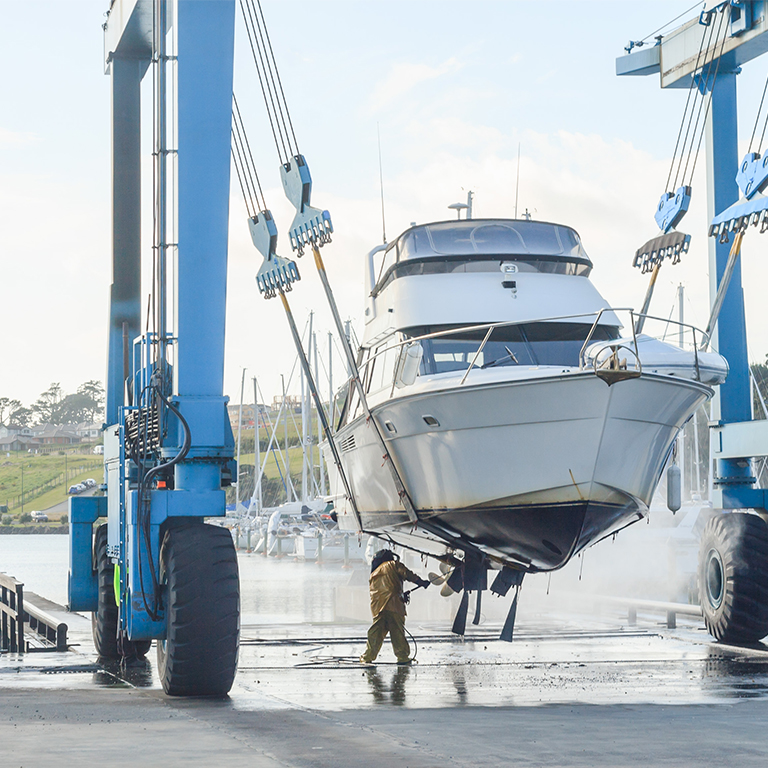Buying a new or used boat can be an exciting process, but also one that can be daunting for first-time buyers. For seasoned pros, it’s not always smooth sailing, but knowing what criteria, certificates or surveys are required, and the level of cover you need from an insurance policy will help give clarity to the process.
Whether you’ve already started the journey to purchase a new boat, be it a custom build or pre-owned vessel, you’ll want to make sure your boat, personal belongings and any liabilities are properly protected in the event of an accident.
Once you’ve decided the type of boat you’re after, whether it’s for leisurely cruising, racing or crossing the Atlantic, budget will be your next consideration. After you’ve chosen your new vessel, it’s important to conduct a survey, depending on the history and age of the boat. The survey will reveal the condition of the boat and will be an important document for your insurer. Finally, on to insurance.
Do I need boat insurance?
Whilst it’s not a legal requirement to have boat insurance in the UK, like your home or your car, anything you invest time and potentially thousands of pounds in, is sensible to protect.
Depending on your circumstances, if you choose marine finance or a marine mortgage to fund your boat purchase, you’ll need evidence of insurance as part of your application. If your new boat is for racing, chartering or for your own personal pleasure and you want to keep your boat in a marina, harbour, regulated lake or travel abroad, you will need insurance. You’ll also need insurance if you want to use inland waterways.1 Turning insurance from a ‘nice-to-have’ to a necessity.
As well as protecting your financial investment against damage or theft, having adequate boat insurance can also help protect against third party liability claims for injury or damage, caused by you or your boat. Consider the financial impact if your boat sank, was significantly damaged or involved in a public liability claim, when making your decision about boat insurance.
What does boat insurance cover?
Depending on who you choose to insure your boat with, cover can vary, but common policy features include (note, cover limits can differ between providers):
- Accidental damage cover, including fire and theft
- Damage cover for boat transit or during lift and launch
- Third party indemnity cover
- Personal accident cover
- Latent defects in equipment
- Frost damage
- Cover for personal items
Whether you choose to buy your boat insurance online or over the phone, it’s important to check the policy detail, so you’re fully aware of what is and isn’t covered and the cover limits available. For example, a standard boat insurance policy doesn’t normally include cover for:
- Damage caused by wear and tear or corrosion
- Damage to machinery following breakdown
- Deliberate acts of negligence or recklessness
- Mast, spars and sails whilst racing
How much is boat insurance?
The cost of boat insurance, much like home or motor can vary depending on; the type, value and size of vessel, where it’s kept and what you’re using it for, whether it’s for business, pleasure or racing.
Boat insurance policies are normally based on an agreed value, which means you and the insurer agree an amount that represents the market value of the vessel and equipment. This total amount is then what you could expect to receive if the vessel was a total loss. Therefore, it’s imperative to both parties that an accurate figure is agreed, to ensure that if the worst should happen, you’re not left out of pocket.
To find out what your boat insurance could cost, contact our team direct on 0800 783 8057.
Our boat insurance tips
To help navigate the world of boat insurance, so you can find the right cover for you and enjoy peace of mind when out on the water, here are some helpful tips and advice:
- Make sure you understand what is covered, and more importantly what is not covered by the insurance policy, along with what your excess is. Whilst premium is important, make sure the policy covers what you need it to.
- Cover for racing and overseas use doesn’t always come as standard, if you require these features, ensure they’re covered by your policy.
- If you’re considering adding your boat to your home insurance policy check that it covers your needs, as some policies don’t cover marine-specific risks, such as salvage work.
- If you have an agreed value policy, firstly ensure it is accurate. Review your boat’s value from time to time and update your insurer with any significant changes so you’re not over or underinsured.
- Ask if a marina berth will lower your premium – due to the improved shelter and security this can sometimes reduce your insurance cost.
- After you’ve purchased your policy, keep your insurer up-to-date with any changes to use, mooring location or the purchase of new equipment to ensure you’re adequately covered.
- If your boat is being transported or refitted, consider insurance before it’s delivered, so you’re protected for any accidents along the way.
At Bishop Skinner Marine we have over 40 years of experience in delivering expert advice and innovative solutions to customers. Covering ocean going motor yachts through to the smallest dinghies. Our team of experts will take the time to understand your insurance needs and deliver a policy tailored to you, contact our team direct on 0800 783 8057 to discuss today.
Sources
1. gov.uk/owning-a-boat/insurance


